This strategy was produced in collaboration with experts from ten leading democracies.
Foreword
Following World War II, the United States and its allies and partners established a rules-based international system. While never perfect, it contributed to decades without great-power war, extraordinary economic growth, and a reduction of world poverty. But this system today faces trials ranging from a global pandemic and climate change to economic disruptions and a revival of great-power competition.
As Henry Kissinger has pointed out, world order depends on the balance of power and principles of legitimacy. The rise of Chinese power is straining both aspects of the existing rules-based system. China benefited from the system and does not seek to kick over the table as Hitler did with the 1930s international order, but China wants to use its power to change the rules and tilt the table to enhance its winnings. Beijing is directing its growing economic, diplomatic, and military heft toward revisionist geopolitical aims. While we once hoped that China would become what we considered a “responsible stakeholder” in a rules-based system, President Xi Jinping has led his country in a more confrontational direction.
Some analysts portray a new Cold War, but this historical metaphor misunderstands the nature of the new challenge. The Soviet Union was a direct military and ideological threat, and there was almost no economic or social interdependence in our relationship. With China today, we have half a trillion dollars in trade and millions of social interchanges. Moreover, with its “market-Leninist” system, China has learned to harness the creativity of markets to authoritarian Communist party control. It announced its intent to use this system to dominate ten key technologies by 2025. We and our allies are not threatened by the export of communism – few people are taking to the streets in favor of Xi Jinping thought – but by a hybrid system of interdependence. China has become the leading trading partner of more countries than the US. Partial decoupling on security issues like Huawei (discussed below) is necessary, but total decoupling from our overall economic interdependence would be extremely costly, and even impossible in the case of ecological interdependence such as climate change or future pandemics. For better and worse, we are locked in a “cooperative rivalry” in which we have to do two contradictory things at the same time.
Addressing the China challenge will require a collective effort on the part of the United States and its allies and partners, in which we leverage effectively our hard and soft power resources to defend ourselves and strengthen a rules-based system. Some pessimists look at China’s population size and economic growth rates and believe that the task is impossible. But on the contrary, if we think in terms our alliances, the combined wealth of the Western democracies – US, Europe, Japan – will far exceed that of China well into the century. A clear strategy with well-defined goals that neither under- nor over-estimates China is necessary for the current moment. Over the past two years, the Atlantic Council has convened high-level meetings of strategists and experts to produce just that.
In this paper, Global Strategy 2021: An Allied Strategy for China, Matthew Kroenig and Jeffrey Cimmino, along with expert collaborators from ten of the world’s leading democracies, propose a logical and actionable strategy for addressing the China challenge. The strategy articulates clear long- and short-term goals and several major strategic elements to help achieve those goals.
First, the paper calls for strengthening likeminded allies and partners and the rules-based system for a new era of great-power competition. This will require, for example, prioritizing innovation, repairing infrastructure, and establishing new institutions to bolster democratic cooperation. A successful strategy begins at home.
Second, likeminded allies and partners should defend against Chinese behavior that threatens to undermine core principles of the rules-based system. Executing this element will mean prohibiting China’s engagement in economic sectors vital to national security, countering Chinese influence operations, and deterring and, if necessary, defending against, Chinese military aggression in the Indo-Pacific.
Third, the authors recognize that China also presents an opportunity, and they recommend that likeminded allies and partners engage China from a position of strength to cooperate on shared interests and, ultimately, incorporate China into a revitalized and adapted rules-based system. Thus, efforts should be made to cooperate with China on issues of shared interests, including public health, the global economy, nonproliferation, and the global environment.
They argue that the desired endpoint of the strategy is not everlasting competition or the overthrow of the Chinese Communist Party, but rather to convince Chinese leaders that their interests are better served by cooperating within, rather than challenging, a rules-based international system. They pay attention to both the rivalry and the cooperative possibilities in the relationship.
The paper presents a sound strategic framework and a comprehensive and practical plan for the US and its democratic allies to follow as they address the China challenge. I encourage experts and officials from the United States and allied nations to study this thoughtful report. Following this strategy could help leading democracies cope with the China challenge and advance a revitalized rules-based system for years to come.
Joseph S. Nye, Jr.
University Distinguished Service Professor, Emeritus
Former Dean of the Kennedy School of Government
Harvard University

The system
The Gist: After World War II, the United States and its allies and partners established a rules-based international system. The rules of this system shape financial systems, trade, diplomacy, and the resolution of disputes between nations.
Sustained by the leadership of the United States and other leading democracies, this system has led to an unprecedented expansion of peace, prosperity, and freedom across the globe.

The rise
The Gist: In 1949, as the rules-based international system was in its infancy, China underwent a pivotal shift. Mao Zedong led a revolution, after which China emerged as a communist state.
But China struggled to grow into a major player on the global stage until Deng Xiaoping rose to power in the 1970s. Deng instituted a series of market-oriented economic reforms that unleashed a torrent of growth. China rapidly became a force to be reckoned with on the world stage.

False hope
The Gist: Many scholars and policymakers in the United States and elsewhere hoped economic liberalization and growth would lead China to shift to a more open political system. It was thought that China would become a “responsible stakeholder” in the rules-based system, adopting its norms.
But that did not happen.
Instead, under President Xi Jinping, China has followed a more confrontational path. Xi has consolidated power at home, eliminating term limits, and set himself up to be China’s most powerful dictator since Mao Zedong. He has stalled or backtracked on promised economic reforms, and China continues to prey on the global economic system. Internationally, Xi has abandoned Deng’s dictum that China should bide its time, and has pursued a more assertive foreign policy.
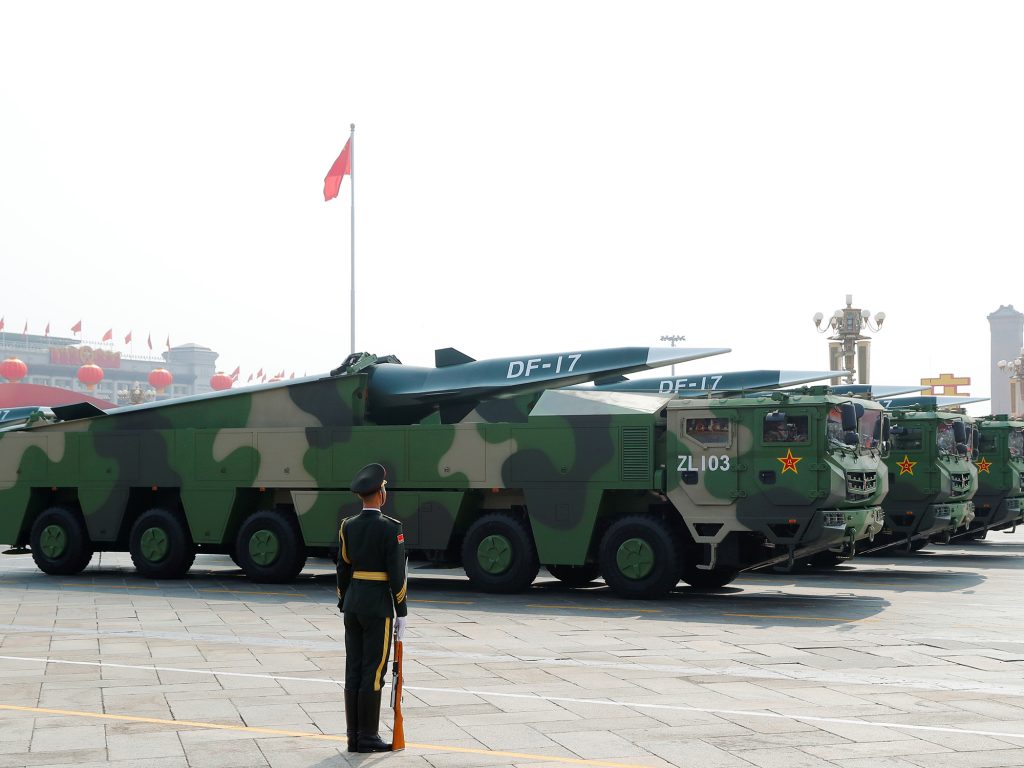

The challenge
The Gist: China presents a serious challenge to likeminded allies and partners, and the rules-based system. This challenge is evident across the economic, diplomatic/political, and security domains.
Economically, Beijing is employing its economic power to engage in unfair trade practices, dominate the commanding heights of emerging technologies, make infrastructure investments that fail to live up to international standards, and engage in economic coercion. As China has become an economic power, its diplomatic influence has also increased, and it has established strategic partnerships with other autocracies, including Russia and Iran. Moreover, China also presents challenges to global governance, as its repressive political model and reliance on nationalism diminish opportunities for cooperation in a rules-based system. Finally, China is devoting its economic resources to strengthening the Chinese military, and it has shifted the balance of power in East Asia, raising questions about whether the United States can defend long-standing partners in the region.

The opportunity
The Gist: Despite serious conflicts of interest, there are several areas in which cooperation with China is necessary to advance likeminded allies and partners’ interests. These areas include economic relations, peacekeeping operations, arms control, public health, and climate change.

The goals
The Gist: A good strategy starts with clear goals. At the broadest level, the strategic goal of likeminded allies and partners should be to revitalize, adapt, and defend the rules-based international system.
As for China, in the long term, likeminded allies and partners should seek a stable relationship with China that avoids permanent confrontation and permits cooperation on issues of mutual interest and concern, and that makes China a cooperative member of a revised and adapted rules-based system.
The problem is that this scenario will be difficult to actualize with Xi as president and the current generation of CCP leadership in power.
So in the short term, likeminded allies and partners should prevent China from undermining the rules-based system and defend their interests and international standards, while affording space for and inviting responsible Chinese behavior.
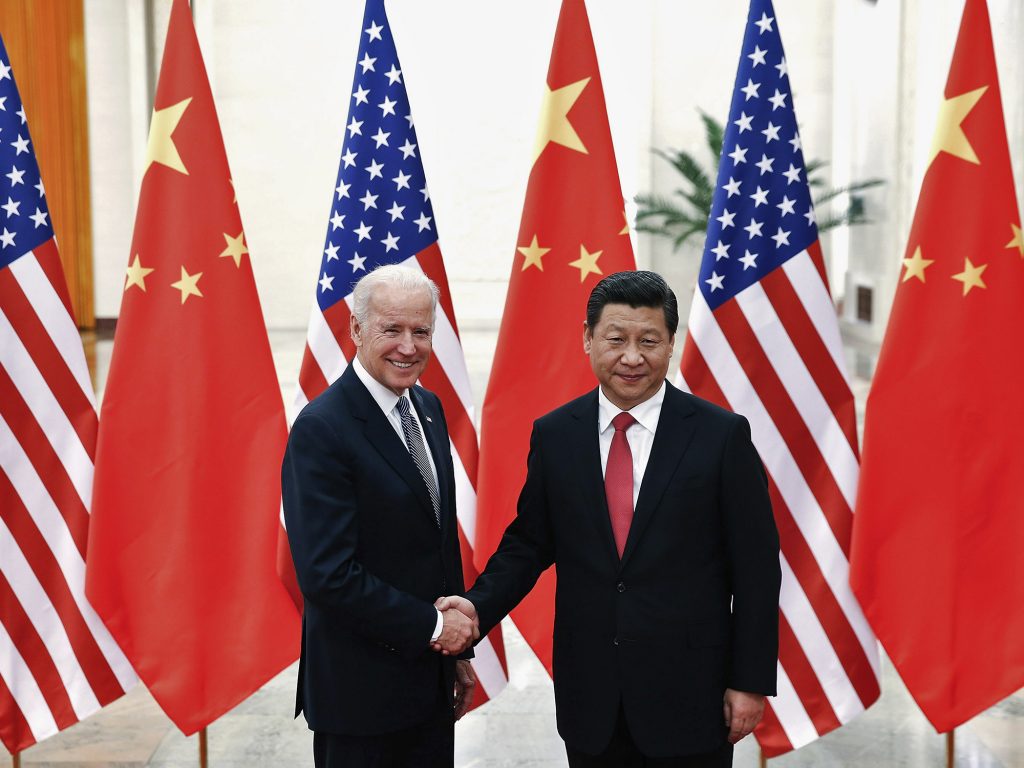
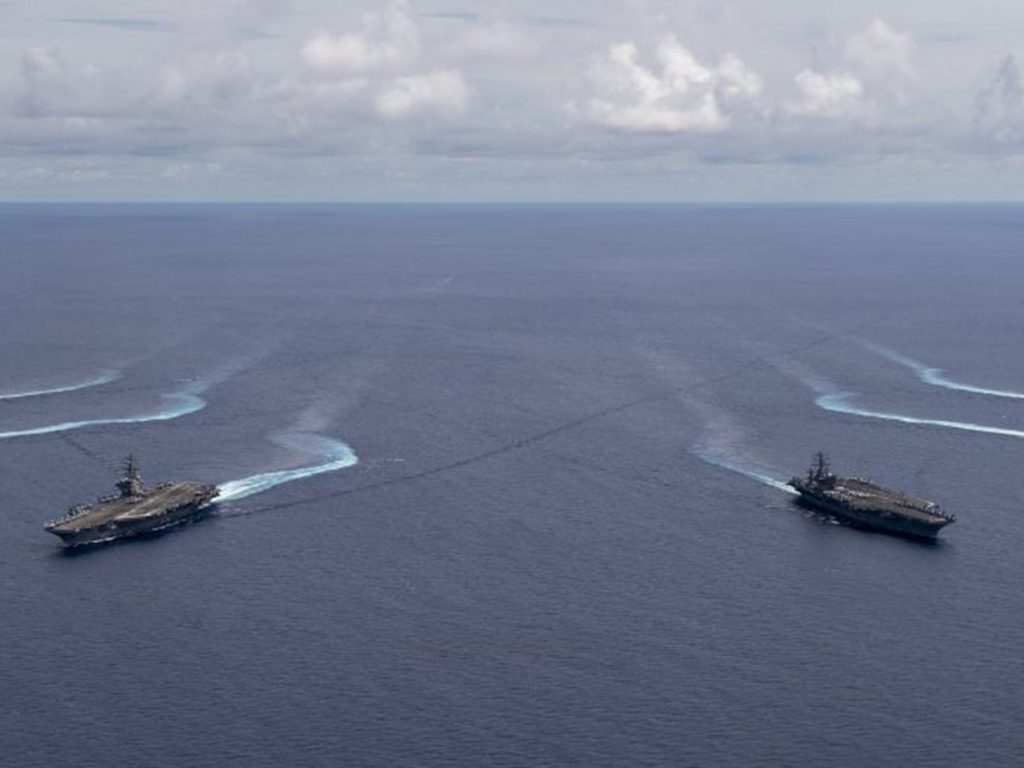
Left: Chinese President Xi Jinping shakes hands with U.S. Vice President Joe Biden (L) inside the Great Hall of the People in Beijing December 4, 2013. REUTERS/Lintao Zhang/Pool (CHINA – Tags: POLITICS)
Right: South China Sea

Strengthen
The Gist: Competition in most domains, such as athletics, is generally more about improving oneself than about bringing down a competitor. Likeminded allies and partners must strengthen themselves, their alliances, and the rules-based system for a new era of great-power competition.
By bolstering themselves, likeminded allies and partners will be in a stronger position, regardless of the choices made by China’s leaders.
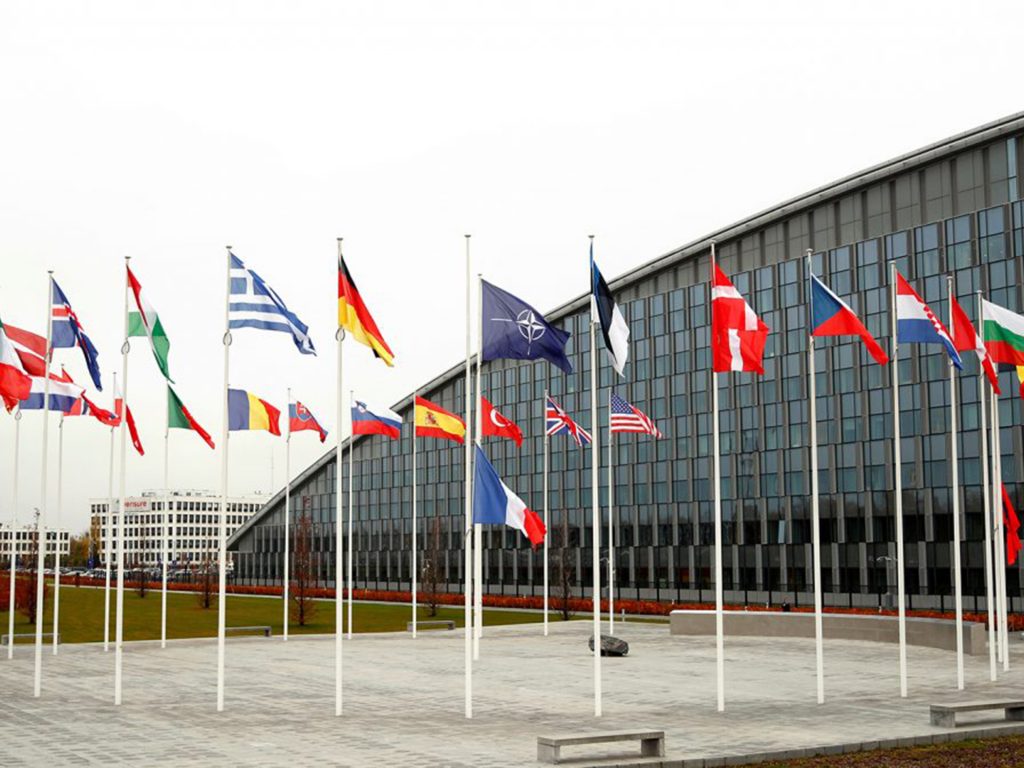

Left: NATO flags
Right: The wall of an apartment house is being printed by a 3D printer in Wallenhausen, Germany, November 25, 2020. Picture taken November 25, 2020. REUTERS/Andreas Gebert

Defend
The Gist: In addition to strengthening themselves to compete with China, likeminded allies and partners must be prepared to defend themselves and the rules-based international system from threatening Chinese behavior. Across the security, economic, and governance domains, they should counter China and impose costs on Beijing when it violates international standards.


Engage
The Gist: As they compete, likeminded allies and partners should look for opportunities to collaborate with China on areas of mutual interests. While they impose costs on China for its threatening behavior, they should also demonstrate the benefits of more fully participating in a rules-based global system, with the ultimate aim of China becoming a cooperative member of an adapted system.
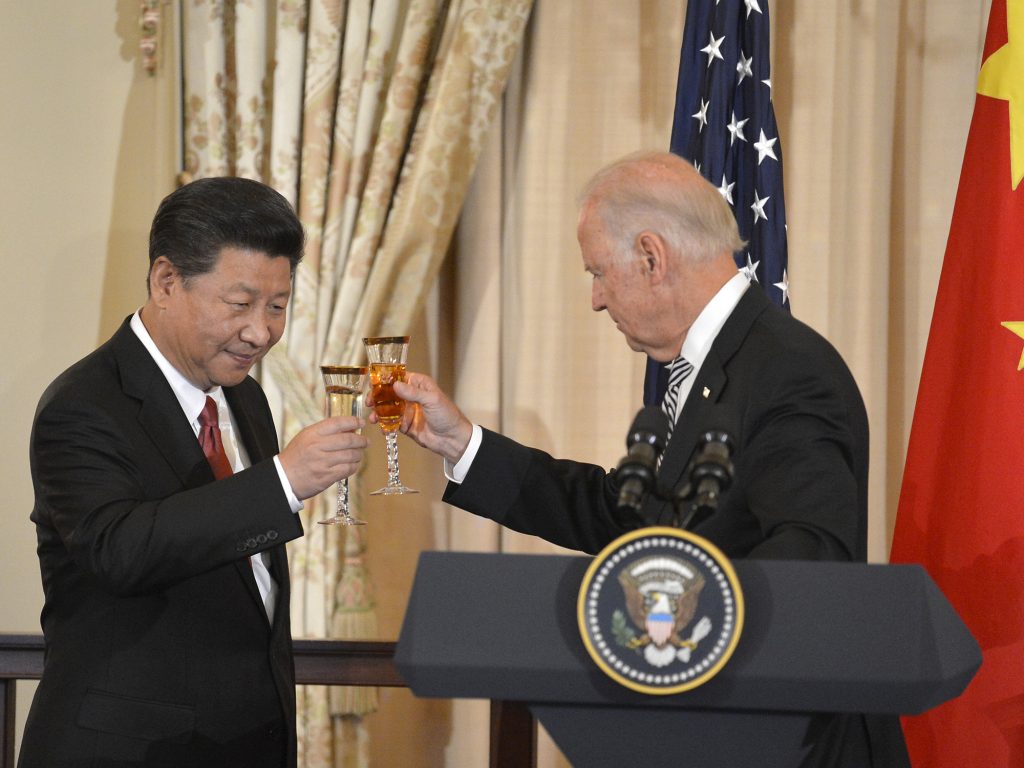

Implementation
The Gist: Likeminded allies and partners came together many times in the twentieth century to defeat autocratic revisionist challengers. Working together, they can once again advance their interests and values, and the broader rules-based system, and fend off the twenty-first-century challenge posed by the Chinese Communist Party.
Conclusion
China is the foremost geopolitical threat to the rules-based international system since the end of the Cold War, and the return of great-power rivalry will likely shape the global order for decades to come. Likeminded allies and partners need to take deliberate and coordinated action to strengthen themselves and counter the threat China poses, even as they seek longer-term cooperation with Beijing.
The free world has an impressive record of accomplishment in defeating challenges from autocratic great-power rivals and constructing a rules-based system. By pursuing this strategy—and with sufficient political will, resilience, and solidarity—they can once again outlast an autocratic competitor and provide the world with future peace, prosperity, and freedom.
Lead authors
D-10 working group collaborators
This strategy paper was prepared in collaboration with experts participating in a working group associated with the D-10 Strategy Forum. The Atlantic Council serves as the secretariat of the D-10 Strategy Forum, which brings together policy planning officials and strategy experts from ten leading democracies, including Australia, Canada, France, Germany, India, Italy, Japan, South Korea, the United Kingdom, the United States, and the European Union, for a dialogue on global challenges. The paper does not reflect any endorsement of the content by national governments or any officials participating in the D-10 Strategy Forum. The experts listed below contributed their views and expertise, and are supportive of the general thrust and major elements of this strategy, but may not agree with every aspect of the paper.
- Nicolas Casarini, senior fellow, Institute of International Affairs, Italy
- Akiko Fukushima, senior fellow, The Tokyo Foundation for Policy Research, Japan
- Ash Jain, senior fellow, Scowcroft Center for Strategy and Security, Atlantic Council, United States
- Sarah Kirchberger, head, Center for Asia-Pacific Strategy and Security, Institute for Security Policy at Kiel University, Germany
- Rory Medcalf, head, National Security College, Australian National University, Australia
- C. Raja Mohan, contributing editor, The Indian Express, India
- Françoise Nicolas, director, Center for Asian studies, French Institute of International Relations, France
- Roland Paris, professor of international affairs, University of Ottawa, Canada
- Alessio Patalano, senior fellow, Policy Exchange, United Kingdom
- Jung-Yeop Woo, research fellow, Sejong Institute, South Korea

The Global Strategy Initiative serves to directly advance the Scowcroft Center’s core mission by cultivating an ecosystem of strategic thinkers and developing sustainable, nonpartisan strategies to address the most important security challenges facing the United States and the world.

